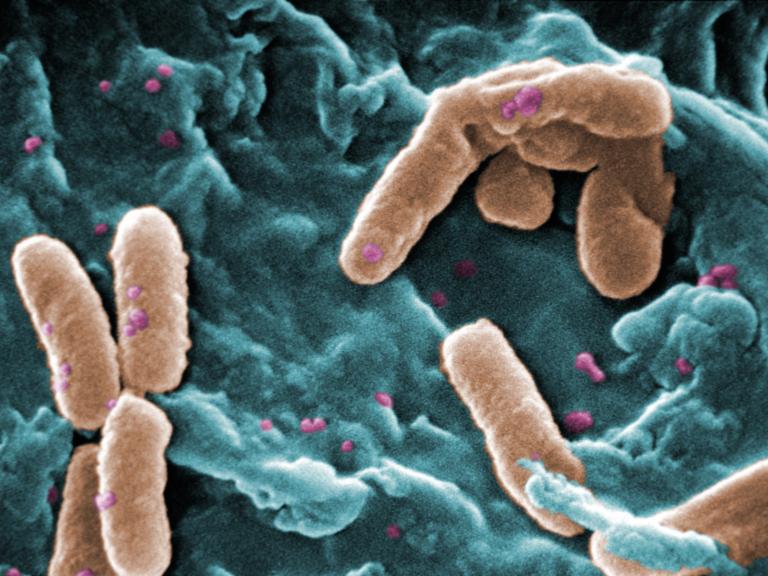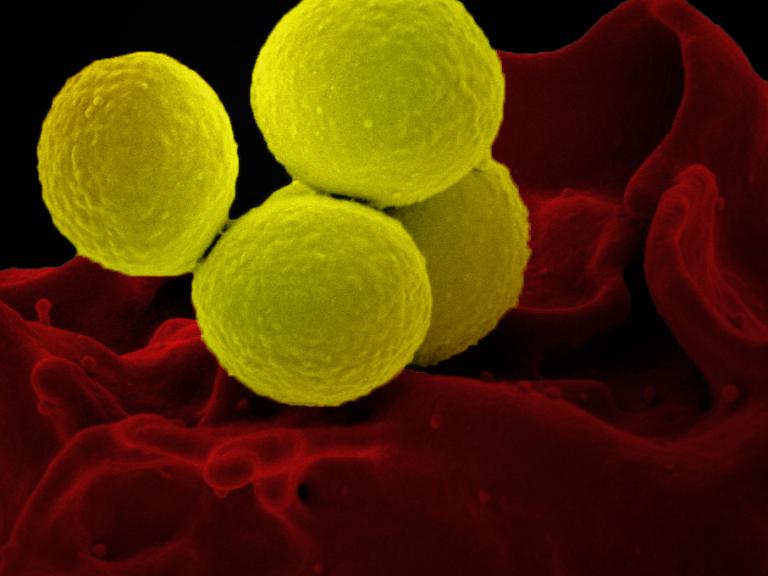In 2013, NIAID launched the Antibacterial Resistance Leadership Group (ARLG), a major clinical effort to address antibacterial resistance (AR). Since its inception, the program has established collaborations in 19 countries and conducted over 40 clinical research studies involving more than 20,000 volunteers. Studies conducted by the ARLG include clinical testing of new drugs to treat multidrug-resistant Gram-negative bacteria, evaluating diagnostic devices in clinical settings, and optimizing treatment regimens to reduce the emergence of resistance. In 2019, NIAID renewed the program’s funding, providing up to $102.5 million over 7 years.
Highlights

NIH-Supported Clinical Trial of Phage Therapy for Cystic Fibrosis Begins
Enrollment has begun in an early-stage clinical trial evaluating bacteriophage therapy in adults with cystic fibrosis (CF) who carry Pseudomonas aeruginosa (P. aeruginosa) in their lungs.

Trial of Existing Antibiotic for Treating Staphylococcus aureus Bacteremia Begins
The trial will test dalbavancin in 200 adults hospitalized with complicated S. aureus infection at approximately 20 trial sites around the United States.

Childhood Pneumonia Study Shows Short-Course Antibiotics Superior to Standard of Care
A NIAID-sponsored randomized, double-blind, placebo-controlled trial study has shown that short-course (five day) antibiotic treatment is superior to standard (10 day) treatment of community-acquired pneumonia (CAP) in children age 6 months to 5 years.
Main Areas of Focus
The renewed ARLG program is focused on three priorities:
- Infections caused by Gram-negative bacteria, such as Escherichia coli, Klebsiella pneumoniae, and other carbapenem-resistant Enterobacteriaceae (CRE)
- Infections caused by Gram-positive bacteria, such as methicillin-resistant Staphylococcus aureus and vancomycin-resistant Enterococci
- Diagnostic tests to optimize use of antibiotics
For more information on the ARLG's accomplishments and scientific direction, please see The Antibacterial Resistance Leadership Group (ARLG): Innovation and Evolution (Clin. Infec. Dis., Volume 77, Supplement, 2023 Oct 15).
Mentoring and Guidance
In addition to developing, implementing, and managing an extensive clinical program, the ARLG is committed to mentoring the next generation of clinical scientists in the field of AR. The ARLG offers three opportunities to meet the needs of trainees at different career stages: the ARLG Fellowship, Early Stage Investigator Seed Grants, and the Trialists in Training Program. For more information, please visit https://arlg.org/. Experts from the ARLG are also available to consult with industry and provide advice, guidance, and protocol design for drug, device, or diagnostic development.
Oversight
The ARLG is led by two principal investigators, Dr. Vance Fowler, Duke University, and Dr. Henry Chambers, University of California, San Francisco. Work is supported by ARLG’s expert committees and the Duke Clinical Research Institute. NIAID/Division of Microbiology and Infectious Diseases (DMID) and an External Advisory Board provide oversight and direction for the ARLG.
Read more about this network: Antibacterial Resistance Leadership Group (ARLG)
Locations
The ARLG has three separate component centers:
- Scientific Leadership Center, directed by Drs. Vance Fowler and Chip Chambers
- Clinical Operations Center, directed by Dr. Heather Cross, Duke Clinical Research Institute
- Statistics and Data Management Center, directed by Dr. Scott Evans, Harvard University
- Laboratory Center, led by Dr. Robin Patel, Mayo Clinic
News and Publications
- NIH-Supported Clinical Trial of Phage Therapy for Cystic Fibrosis Begins – October 4, 2022
- Trial of Existing Antibiotic for Treating Staphylococcus aureus Bacteremia Begins – April 27, 2021
- Childhood Pneumonia Study Shows Short-Course Antibiotics Superior to Standard of Care – October 23, 2020
- NIH Renews Funding for the Antibacterial Resistance Leadership Group – December 13, 2019
- Study Supports Expanded Testing for Gonorrhea and Chlamydia – July 1, 2019

